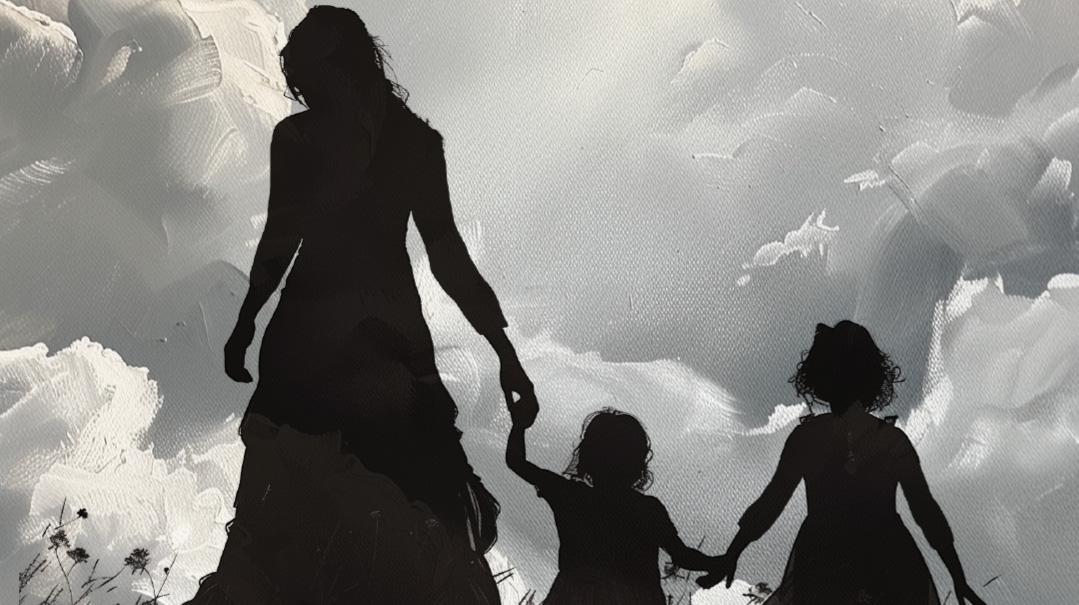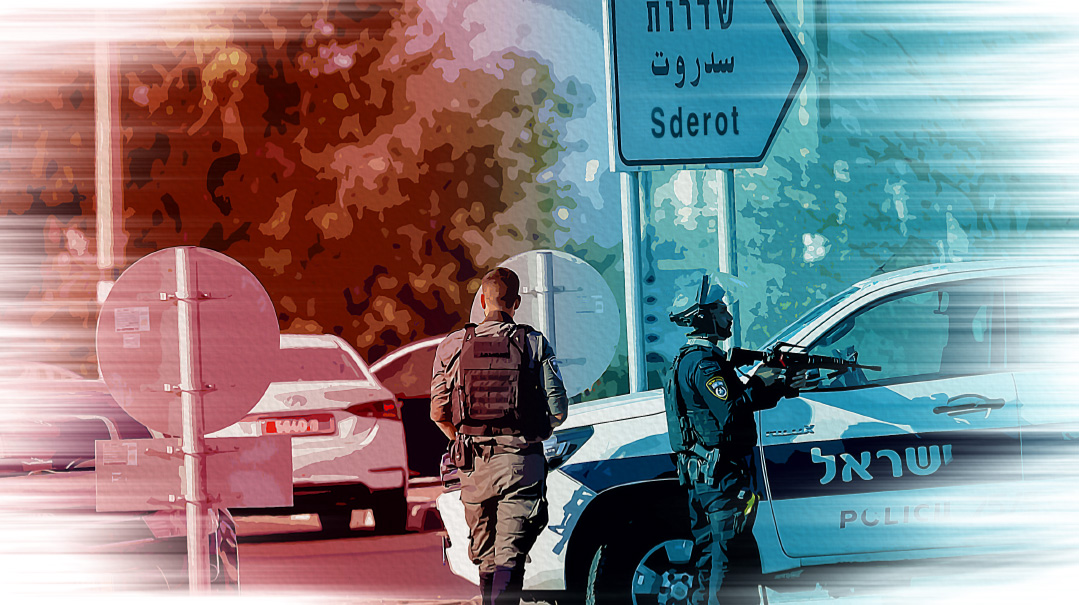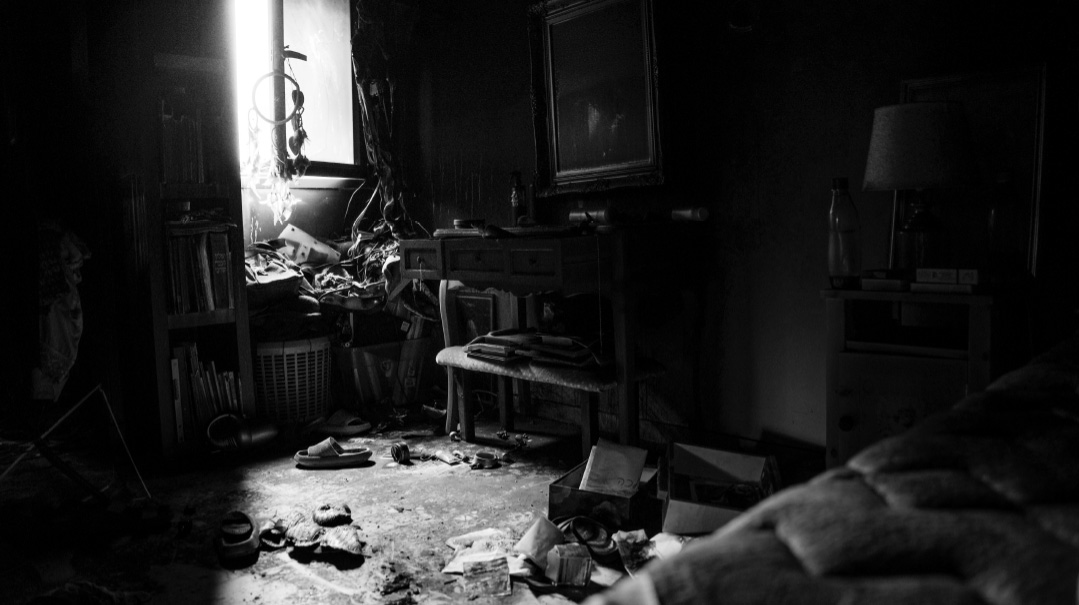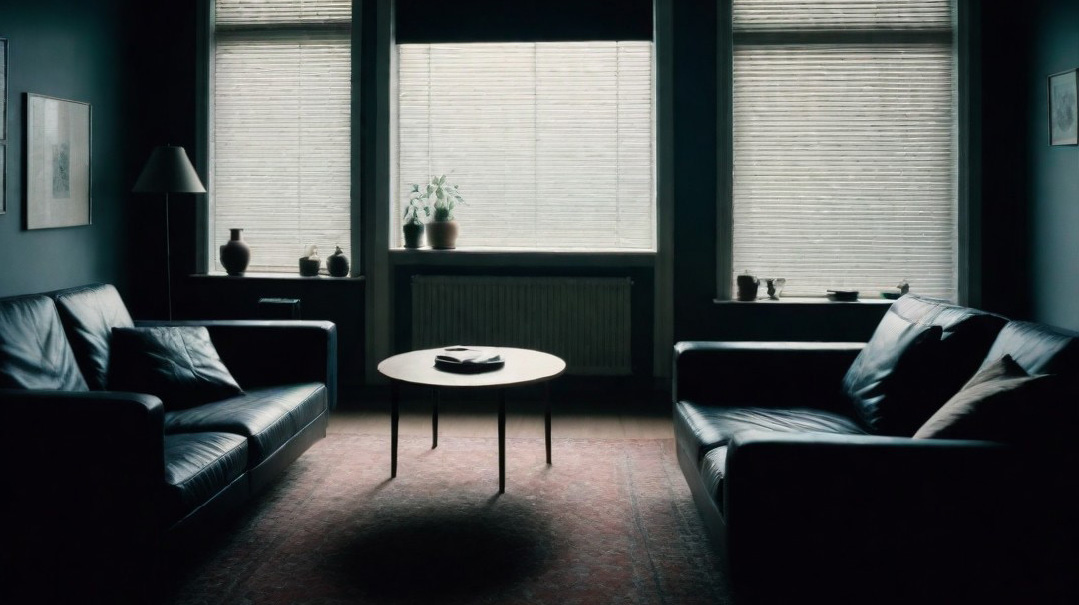From the Home Front
| October 31, 2023Reader roundtable: Our nation’s at war — what's our role? Six women weigh in

As part of a nation at war, we’re all struggling with feelings of pain and fear. But those of us not directly impacted by the crisis are left wondering: what should day-to-day life look like now? Should we be striving to create a sense of normalcy and structure for our kids, or be consumed by grief? Where is the line between protecting our emotional health and being insensitive? How do we balance practical assistance with spiritual efforts? Six women weigh in.
Chani
42, Yerushalayim
Russi
40, Yerushalayim
Yocheved
36, Ramat Beit Shemesh
Avigail
35, Monsey
Esti
31, Lakewood
Rena
28, Toronto
Yocheved
Let’s start with the news: How often are you checking the news, do you think it’s good, bad, helpful?
I’m trying to cut down on my obsessive news refreshing, but when I told that to a friend, she said, “Oh, so you check the news twice a day?” I was like, “Uh, try five times an hour instead of every minute.” It’s a work in progress.
Esti
I think I check the news too much. If I didn’t analyze everything, I think I’d have a more honest view of what’s going on. If you really believe that these people are all puppets — which I do — what does it matter what the facts on the ground are? I think it’s causing me to lose my focus, since I’m busy getting angry at things that are irrelevant.
Yocheved
But really, you just see the rising anti-Semitism and the falling levels of caring around the world when you check the news. I think there was this immediate shock and horror that the whole world felt, and now it’s fading, and that’s horrifying.
Rena
You don’t think the anger or fear drives you toward action, or teshuvah, something?
Yocheved
It’s easier to be angry than it is to cry or feel sad or scared. I think the anger is an escape.
I feel like I’m checking the news too much. But at the same time, I have a lot of friends who are completely disengaged. And I don’t think that’s right either. But maybe that’s just my guilty conscience.
Esti
Yes! That’s what I’m struggling with right now. On the other hand, checking the news a lot is diluting my understanding of what’s actually happening, because you get so caught up in commentary and analysis that you lose what you should be seeing. You hear people teitching it up, like, oh, if Trump was in office, this would have never happened. I think that’s apikorsus.
But then the other question is, does looking at the news that much make you less emotional about what’s happening? When we first found out what had happened, before we checked the news, there was just such a raw emotion there. Once you start analyzing it, you lose that because now you’re getting, for lack of a better word, academic about the whole thing.
Rena
I think that time does that anyway, regardless of what you check. On the other hand, there are some things that really make you pause. I watched an interview yesterday of a girl who was at the festival. She was obviously very sad, but she was not hysterical at all, just very calmly recounting her experience. It was incredibly heartbreaking and difficult to listen to, and it felt just as raw as when I heard on Yom Tov. It was just so horrible.
Russi
Yes, one way to stay connected is to listen to other people’s perspectives and hear what they’re going through. I’ve been reading profiles of the people who were lost, or those who are missing. When I feel the need to check something and the headlines haven’t changed, I read another one. When you finish it, you’re in tears.
Esti
So let’s assume being into the news is not the greatest reaction right now. The thing is, I’m not going to spend my time that I would have been checking the news saying Tehillim — that’s the problem. I’d be doing something stupid instead. Maybe every time I look for news updates I should say another perek of Tehillim. Maybe that would help a little.
Chani
From reading the news, what’s hitting me more and more is that logically, this whole situation makes no sense. The way it started seems to defy teva—who could have imagined a security failure of these proportions?—and what is needed for us to beat Hamas also defies nature. It’s so clear that the only way we can win is with Hashem, and that all we can do is daven.
Yocheved
So you’re saying we need to daven. We keep saying, “What could I do besides tefillos?”
Esti
If you understood the power of tefillah, you wouldn’t say, “besides tefillah.” Maybe we don’t believe enough in the power of tefillah in general, or maybe it’s easier for me to click “Buy Now” on Amazon than it is for me to daven a truly heartfelt Shemoneh Esreh. Rav Ephraim Wachsman gave a shiur and he said this. He said “You have to believe that your tefillos really, really matter. What should I do besides the davening? Daven. That’s what you should do.”
Chani
I read that during the Yom Kippur War, the Toldos Aharon Rebbe had a Simchas Beis Hashoeivah. He said the avodah is to bring down the simchah because the simchah has the power to bring yeshuah. I was thinking of that very much on Simchas Torah; I knew that our rav had quite a bit of information about what was happening, and he made a conscious decision that this is Simchas Torah, and we are having Simchas Torah. And watching the rav dance in this very deliberate way, understanding that this is the avodah of simchah, knowing what he knew about what was going on… I sensed that he was channeling something very powerful and otherworldly.
I don’t understand what these hidden powers are, but I will say that one of the things I’m davening for is that my house should still be a warm and healthy place for the people who live here. You can have positivity and pain at the same time.
Esti
On that note, how has the day-to-day of your life changed? How is this affecting your kids?
I’m having a hard time doing basic tasks because I’m so occupied with this. I never had that before, not during COVID when all my kids were home, never. It’s hard to talk to people about normal things — this is all I want to talk about. I wonder if that’s because it’s the only thing that’s important to me right now, or it’s my way of processing. My kids hear us talking about it a lot, but the schools are not talking about it at all. I’m a little surprised by that. I remember when we were kids and there was a war, we definitely heard about it. What happened? Did people get more woke?
Rena
Yes, I definitely think kids should be nosei b’ol. The rosh yeshivah of Darchei Torah, Rav Yaakov Bender said, if you want your child to be nosei b’ol¸ tell them to sleep with one less pillow, take one less snack. But for the first time, I hear people saying, “Why would I punish my child because of what’s happening?” Oy. That’s the reaction?
Yocheved
I also heard that in a speech, but I felt like, I’m here in Eretz Yisrael. My kids are living this, they’re scared. I’m not taking away their candy. But maybe I shouldn’t be eating any candy myself. Maybe chocolate isn’t an acceptable coping mechanism right now.
Avigail
I think that’s a difference between us in America and you in Israel. We’re not there — we’re not hearing sirens and running to shelters. There’s that feeling of being removed from it and then feeling guilty for being removed from it.
Yocheved
I have the same feeling here in Ramat Beit Shemesh. We haven’t had any sirens recently, baruch Hashem. I don’t have immediate family in the army, we’re not constantly running to bomb shelters, and so I’m also struggling with these same feelings of guilt and privilege that I’m not so directly impacted.
Rena
It’s a very hard balance. My kids are little and it’s hard to know how central this should be in our home. One of my kids was hearing things on the bus that were bringing him to tears, which is so not like him. I don’t want my kids to think that we’ve moved past this. We haven’t, but they’re also little, and I don’t want to scare them.
I discuss the situation with my husband all the time — it’s literally all we talk about. I just feel like I’m privileged that I’m not running to a bomb shelter, and I’m privileged that I have the option to think about mundane things. But that feels so gross. I should be as worried as people who are running to bomb shelters every five minutes. But then, these are my life circumstances.
Why am I guilt-tripping myself into circumstances that are not my reality?
Chani
I think what Rena is saying is that everybody’s looking for the trigger that will make them feel nesia b’ol. And for some people, it is that news story that touches them in an emotional way. But at a certain point you have to figure out for yourself what is going to help you individually or help the situation.
I think that one of the calls of the hour is to feel pain, but not to feel pain to the point that you’re numb or you’re paralyzed or you can’t be the mother your kids need because you’re depressed. You can’t be immersed in the pain to the point that you have no patience for your children, “Don’t you know that terrible things are happening? Why can’t you brush your teeth yourself?” or, “We need shalom here so, so badly — can you just stop fighting with your brother already?”
Russi
You were talking about guilt. I heard two Israelis schmoozing the other day, and one was saying that it’s unbelievable how much money and supplies and gifts are coming from America, and the other one says, “It’s their guilty conscience.”
Chani
Why do we need to be cynical? We are seeing Klal Yisrael at its best, as a nation of givers. The outpouring of giving is beautiful. In my community, women are working 24/7 to arrange housing, food, clothing, even temporary employment and riding toys for displaced people. It’s unbelievably inspiring and so, so beautiful. They are not “business as usual” with some extra Tehillim.
But I also think that we’re going to reach a point where people don’t need helmets anymore, and they’re not going to need supplies anymore, and Hashem’s not going to want you to write a check anymore. Hashem’s going to want something from inside of you, and that’s much harder.
What is it? I don’t know. Probably the little things, like having more patience for your kid who lost his shoe, and he had to leave to school two minutes ago.
I’m finding it can be very frustrating to have that same patience for older teenagers. When you’re going to the neighborhood Tehillim and making suppers for soldiers and doing whatever you can, and your teenagers just aren’t feeling it — they want to go out with friends. I want to tell them, “We’re not buying iced coffee now, this is an eis tzarah, we’re sitting and saying Tehillim.” But as with all of parenting, I think the most we can do is try to set an example, and then come to peace with where our kids are at.
Yocheved
I don’t know, I do think we can push our kids a bit more. One of my younger teenagers was obsessing over her wardrobe — she needed new sweaters, she needed new boots, and I’m thinking, “Who cares about your stupid boots?” She’s pretty sheltered from the news, so that Friday, I made the deliberate decision to show her the list of hostages’ names that I’d printed to daven for, to show her how many names there were. I felt like she needed a greater sense of what was going on. And she did take a break from her endless shopping requests.
Russi
Teens especially have so much that they want. They’re very, very, very, very focused on what they want to get done next or what they’re hoping to get done next. And anything that comes up that might disrupt that, they’re not receptive to it. You can’t impose it on them. It has to come from inside.
Avigail
I’m not sure that you can’t impose your personal sensitivities as a chinuch method. I went to high school out of town, and the family I boarded with was very makpid not to listen to music, except on Rosh Chodesh, because there’s no Beis Hamikdash. These past few weeks, I came back to that. I didn’t make a big, huge announcement that we’re not having music. Maybe I should have, but I’ve stopped putting it on. It was imprinted into my psyche in a way I’d never realized.
Chani
But is your house supposed to be like that? Is your house supposed to be like Tishah B’Av?
Maybe because I live here in Israel where kids can pick up on the tension and worry, or maybe because I know that when I’m feeling down it affects the atmosphere, I want my house to be a place where we have cheerful kids’ music playing during breakfast. Is it a problem to be cheerful? For myself, I have no desire right now to listen to music for pleasure, but for my kids — I don’t think it’s insensitive to consciously create a positive atmosphere.
Yocheved
I’ve been wondering about that. I remember when I sat shivah — I don’t think you can anticipate how intense it is until you’ve experienced it. There are halachos, you can’t have a hesech hadaas from the grief, and you really can’t, anyway — the grief is so consuming. You can’t eat, you can’t sleep. But now, there are definitely times when I’m deliberately distracting myself. Obviously I need to be a functional wife and mother. But is that really the right thing, or am I just cheating when I read stupid books to help me fall asleep? I don’t think being paralyzed with fear or walking through various nightmare situations is what Hashem wants from us, but maybe I should be channeling that emotion into tefillah or teshuvah or grief.
On Tishah B’Av, we have halachos. You’re not allowed to have hesech hadaas from aveilus. Your focus is supposed to be on what happened.
Avigail
Right, but on the other hand, Yocheved, we’re not in aveilus right now.
Yocheved
Should we be?
Russi
On Friday, I passed by the shuk and there were a group of boys dancing to Doni Gross’s new medley, singing Am Yisrael Chai. I continued on to my regular fruit and vegetable store, and the owner, a 65-year-old Israeli man was talking to the chassidish guy in front of me, and he said, “They wanted to come bring that music here, and I told them they had to leave. I’m a chazzan and I haven’t put on music in two weeks. They can’t come dancing through here like this. How do you know if somebody here is sitting shivah or just lost somebody? They can’t be doing this.”
The guy was arguing with him, trying to tell him that’s how they feel involved — they probably have brothers who are serving. The seller said, “I don’t care, that’s not it. We can’t be dancing in the street. I fought in ’73, I know exactly what’s going on down there. We are not listening to music now.” Then he continued, “You know, one day this week some guy came in with a bunch of tattoos, he was yelling at all the nonessential stores that were open. He said fruits and vegetables are fine, but the candy stores? The beer stores? How can they be open?” So the chassidish guy told the store owner, “Kulanu mitkavnim l’oto davar. We all mean the same thing. We just have a different way of getting there.”
Esti
That’s a nice thought, but are all approaches really equally valid?
You see that letter that the talmidim of Rav Shternbuch put out, where he’s so frustrated by the level of apathy he just wants to shake us all and be like, don’t you see what’s happening here? This can get so much worse. We are in an eis din. We’re literally careening to disaster and people are just like “Oh, hey, you want to go for coffee? I mean, I need to be functional.”
Rav Shternbuch said the Kadmonim were scared of this year. They didn’t want to be in it. And we’re all like, “Yeah, whatever, I’ll try. I’ll watch a chayal video.” I think one of the big problems with that approach is that you run the risk of equalizing a good idea with a bad idea. Not all approaches are okay. You can’t just come to Rosh Hashanah and Yom Kippur and be like, “You know what, Unesaneh Tokef freaks me out. I can’t deal with the stress of Yom Hadin.” Uh, no, there’s a right way and a wrong way to behave in different times.
Yocheved
I think those videos lull us into a false sense of activism, like, “Okay, I watched three videos of people dancing with chayalim, I cried, I’m good.” I think these videos serve an important purpose, but it’s too easy for them to become the goal.
Esti
So what is the right way? On the one hand, we’re supposed to have simchah in our homes, because simchah is a mitzvah. But what does simchah mean? What is it really?
I don’t know what you’re doing in Israel, but here, I see lots of people just going about their day. My friend just told me she’s going on vacation with her sisters. She feels for the war. She sent vests. But she’s going on vacation.
Yocheved
Ouch. I’m not arguing and saying that we should be like, “Okay, kids, no more food until the war’s over.” I know I have to keep a functioning household and be a functioning mother. But I like the idea of not listening to music. And a friend told me yesterday that every day she would try to do something small, take a concrete step to be better. I feel like this is a time when we’re supposed to be transforming ourselves.
Russi
I walked home from work in Yerushalayim the other day, and I was thinking, you know when they talk about that German housewife during the Holocaust who didn’t have any Jews in her village, how she said I had no clue what was going on an hour away from my house and everyone’s like how could you not know? I’m walking probably less than an hour away from the action, and yes, it’s quieter. There aren’t people on the streets, but it feels pretty normal. And an hour away, I don’t even want to know what’s going on. What does national grief mean, if you can’t even feel it on the streets?
Chani
Can I take this in a different direction? I’ve heard people asking, “What were they doing in Eastern Europe in 1940, when they started to hear what was happening?” I’ll tell you what they were doing — they were making potato kugel and cleaning chicken. And I used to say that in a somewhat cynical tone and think, “How could they keep peeling potatoes when their world was about to explode?”
But now that I’m older, and I guess more secure in the fact that mothering really does mean a lot of physical nurturing that doesn’t always feel overtly spiritual, I would give the same answer and add — they were nurturing their families as best as they were able, and I think that’s what they were supposed to do.
You mentioned transforming yourself. I don’t think you can transform yourself so easily. And more important, this is where Hashem put you — as the emotional anchor of your household. So your responsibility is to be empathetic, aware, and tuned in. To make sure your husband and children have food and a warm home and clean clothing and a listening ear. And you can integrate all those other emotions into what you do. Invest more in your tefillah, say more Tehillim, bake for the chayalim if you can, but I don’t think it should obstruct or overshadow the prime responsibility that Hashem set in front of you right now.
Esti
So you’re saying that we should step it up — our jobs that we always had — and just be more deliberate about what we should do.
Chani
Well, this is where Hashem put you – so it must be that you can build up Klal Yisrael’s zechusim from this place and this role. Even though it’s not glamorous, it doesn’t give you any rush.
Yocheved
And nobody appreciates it, literally.
Rena
The scary thing is that changing is a lifetime’s work, and on a day-to-day or weeklong basis, you see no change. It’s gradual, but this is so frantic, so frenetic. It feels like we’re running out of time, but there’s this pressure to be the person you want to be when Mashiach comes.
Avigail
The thing I keep going back to for myself is where is my battlefield?
I feel like we’re always looking for that big thing, that major change, but we don’t realize that it’s in the little details. Chani, you said this before, but when you pull through and do something that is hard for you, maybe you give your kid his 18th cup of water when he is supposed to be sleeping, and you do it with a smile — that’s real sheviras hamiddos. Nobody’s gonna remember it. But this is Klal Yisrael’s war, and this is my battlefield.
(Originally featured in Family First, Issue 866)
Oops! We could not locate your form.







